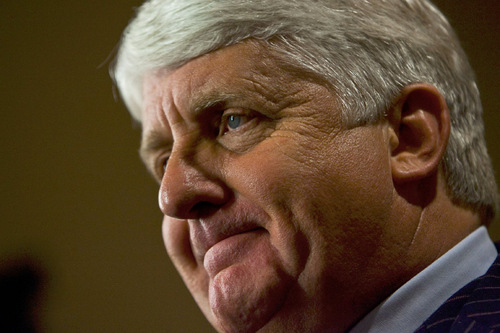This is an archived article that was published on sltrib.com in 2011, and information in the article may be outdated. It is provided only for personal research purposes and may not be reprinted.
With the U.S. Department of Interior considering new wilderness protections for potentially millions of acres of public lands, a coalition of Utah counties filed a lawsuit this week accusing federal officials of overreaching their authority and threatening the state's economy.
The Utah Association of Counties and Uintah County are suing the Department of Interior to reverse its new wildland policy, which could restrict oil and gas development and off-road recreation on up to six million acres.
The lawsuit claims the policy violates a 2003 agreement between then-Gov. Mike Leavitt and former Interior Secretary Gale Norton to abandon wilderness consideration for vast tracts of Utah lands.
The controversy over wilderness policy is no more personal than in Uintah County, where Commissioner Mike McKee warns that the economic repercussions could be far-reaching. He testified before Congress that the policy threatens at least $15 billion worth of investment in his community's oil and gas industry over the next decade.
"These decisions very much affect the economy of our county, of the Uinta Basin and of the state of Utah," he said Wednesday. "These companies are fully willing and prepared to make major investments into eastern Utah if they can have a measure of predictability."
Although the Department of Interior declined to comment on the dispute because it involves litigation, a Bureau of Land Management spokesman defended the changes as a more "balanced" approach to public lands stewardship.
"The common sense reforms we've made are about restoring balance and getting the most we can from our public lands in the way of energy, recreational resources and healthy wildlife for hunting and fishing," BLM spokesman Matt Spangler said.
It's a position the Southern Utah Wilderness Alliance shares. The environmental group says the wilderness protections ordered by the Department of Interior represent a return to the "status quo" after the flawed Leavitt-Norton settlement of 2003.
"There is absolutely nothing illegal or questionable about the wild lands policy," said Heidi McIntosh, associate director of SUWA. "It is just that BLM lands were a free-for-all for industry and off-roaders during the Bush administration."
That question now resides in the courts. There, policy critics will argue that only Congress — not the Department of Interior — can place such restrictions on Utah lands.
"The hard-working people of Utah, like so many others across the country, can see right through the wild lands policy for what it really is — an end-run around Congress to impose restrictive new policies on millions of acres of federal land," U.S. Rep. Rob Bishop wrote in a statement.
It may not be the only lawsuit challenging the policy in Utah.
John Swallow, Utah's chief deputy attorney general, confirmed that the state plans to file its own lawsuit challenging the policy.
Thomas Burr contributed to this report.



